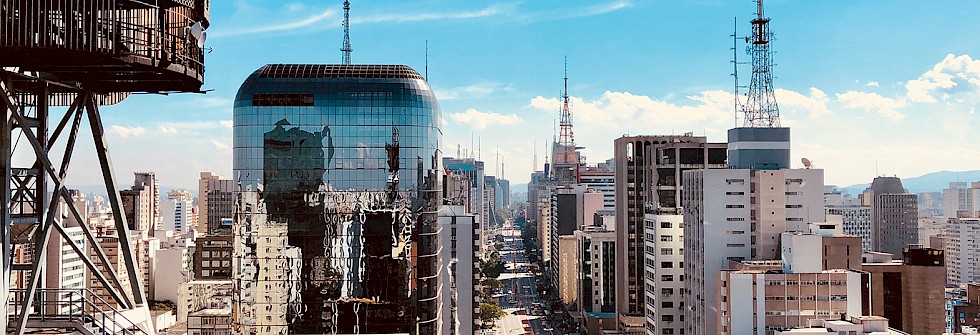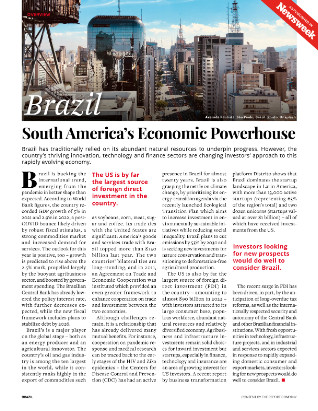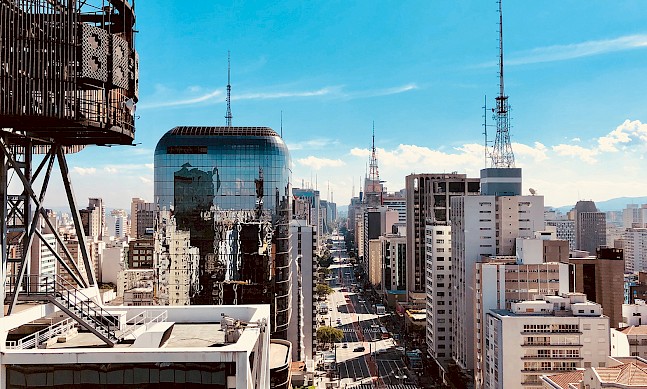Brazil has traditionally relied on its abundant natural resources to underpin progress. However, the country’s thriving innovation, technology and finance sectors are changing investors’ approach to this rapidly evolving economy.
Brazil is bucking the international trend, emerging from the pandemic in better shape than expected. According to World Bank figures, the country recorded GDP growth of 5% in 2021 and 2.9% in 2022, a post-COVID bounce likely driven by robust fiscal stimulus, a strong commodities market and increased demand for services. The outlook for this year is positive, too – growth is predicted to rise above the 2.5% mark, propelled largely by the buoyant agribusiness sector, and boosted by government spending. The Brazilian Central Bank has already lowered the policy interest rate, with further decreases expected, while the new fiscal framework includes plans to stabilize debt by 2026.
Brazil’s is a major player on the global stage – both as an energy producer and an agricultural innovator. The country’s oil and gas industry is among the ten largest in the world, while it consistently ranks highly in the export of commodities such as soybeans, corn, meat, sugar and coffee. Its trade ties with the United States are significant: America’s goods and services trade with Brazil topped more than $120 billion last year. The two countries’ bilateral ties are long-standing, and in 2011, an Agreement on Trade and Economic Cooperation was instituted which provided an even greater framework to enhance cooperation on trade and investment between the two economies.
The US is by far the largest source of foreign direct investment in the country.
Although challenges remain, it is a relationship that has already delivered many mutual benefits. For instance, cooperation on pandemic response and medical research can be traced back to the early stages of the HIV and Zika epidemics – the Centers for Disease Control and Prevention (CDC) has had an active presence in Brazil for almost twenty years. Brazil is also grasping the nettle on climate change, by prioritizing its energy-transition agenda via the recently launched Ecological Transition Plan which aims to increase investment in environmentally sustainable initiatives while reducing social inequality. Brazil plans to cut emissions by 53% by 2030 and is seeking new investments for nature conservation and transitioning to deforestation-free agricultural production.
The US is also by far the largest source of foreign direct investment (FDI) in the country – amounting to almost $90 billion in 2022 – with investors attracted to its large consumer base, populous workforce, abundant natural resources and relatively diversified economy. Agribusiness and infrastructure investments remain solid choices for inward investment but startups, especially in finance, technology and insurance are an area of growing interest for US investors. A recent report by business transformation platform Distrito shows that Brazil dominates the startup landscape in Latin America, with more than 13,000 active startups (representing 63% of the region’s total) and two dozen unicorns (startups valued at over $1 billion) – all of which have received investments from the US.
The recent surge in FDI has been driven, in part, by the anticipation of long-overdue tax reforms, as well as the internationally respected security and autonomy of the Central Bank and other Brazilian financial institutions. With fresh opportunities in technology, infrastructure projects, and in industrial and services sectors expected in response to rapidly expanding domestic consumer and export markets, investors looking for new prospects would do well to consider Brazil.



